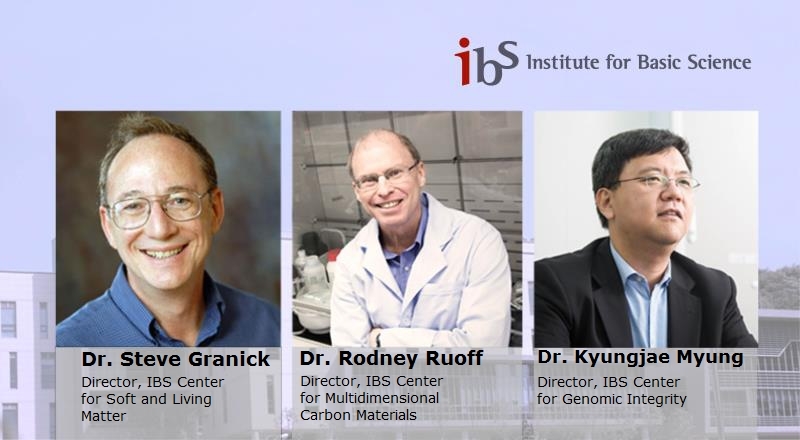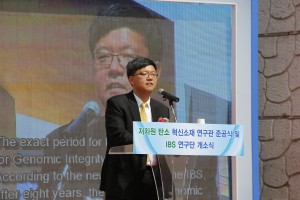On April 27, UNIST held a ceremony not only to mark the completion of new IBS Center for Multi-Dimensional Carbon Materials (CMCM), but also to celebrate the establishment of two other IBS research centers on campus. During the course of the event, each IBS director shared their research goals and aspirations for growing research and the impact that will have on the city of Ulsan leading up to and beyond 2030.
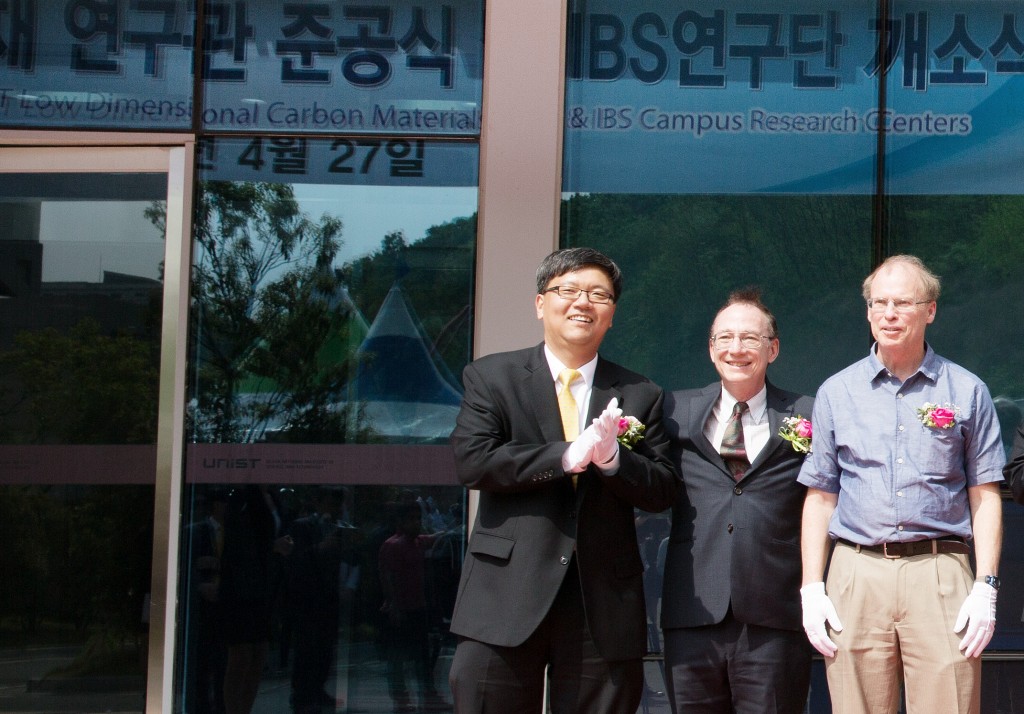
IBS directors of UNIST are posing for a portrait at the completion ceremony of new IBS Center for Multi-Dimensional Carbon Materials (CMCM). From left are Director Kyungjae Myung (IBS Center for Genomic Integrity), Director Steve Granick (IBS Center for Soft and Living Matter), and Director Rodney Ruoff (IBS Center for Multidimensional Carbon Materials).
UNIST has been designated as one of the world’s foremost graphene R&D institutions, hosting three IBS campus-based research centers. These research centers will be receiving the funding of 300 billion (KRW) over the next 10 years from the Institute for Basic Science (IBS), South Korea. With support from the Government of Korea and the city of Ulsan, UNIST hopes to contribute to the development of local industry and economy through transferring the research experience, knowledge, and technology of its scientists.
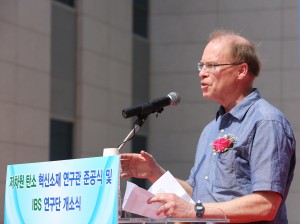
Dr. Rodney S. Ruoff, Director of the CMCM IBS Center at UNIST. (Photography by IBS Public Relations Team)
Dr. Rodney S. Ruoff is the Director of the IBS Center for Multidimensional Carbon Materials and professor at UNIST. The CMCM IBS Center is dedicated to discovering and charaterizing new materials with exceptional physical, chemical, and biomedical, and other properties. When asked to share some thoughts on today’s ceremony, he states, “We see a bright future for the fundamental science of carbon and related materials in Ulsan. Our goal is to make CMCM a world-class Center for new carbon and related materials.” He continued by saying, “We appreciate the continued support from the IBS and UNIST, as well the city of Ulsan for showing tremendous vision in helping to make this building and its infrastructure “come to life.”
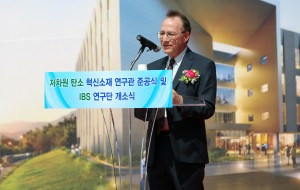
Dr. Steve Granick, Director of the IBS Center for Soft and Living Matter at UNIST. (Photography by IBS Public Relations Team)
Dr. Steve Granick is the Director of the IBS Center for Soft and Living Matter and professor at UNIST. His research interests include polymers, complex fluids, and biomaterials. Established in 2014, this Research Center for Basic Science aims to lead in understanding the principles of soft and living matter and to make new discoveries that will benefit humanity. Commenting on today’s special occasion, Dr. Granick stated: “I am impressed that Korea is investigating on its future in such a creative way. As the Director of this center, my goal is to achieve science, scientific results, and even more importantly to train the next generation of scientists.” He continues by saying, “However, as an IBS research center Director, I can do nothing myself. The real work will be done by students and researchers, and I am only the coach.”
Dr. Kyungjae Myung is a world-renowned scientist and has been also appointed as a UNIST Distinguished Professor in recognition of his significant scientific achievements in the fieldof genomic integrity. He is also the Director of the IBS Center for Genomic Integrity (CGI) at UNIST. At this center, he will be conducting research, regarding genome stability and chemotherapeutic application. His studies of DNA repair pathways are expected to lead the development of therapeutics for many human illnesses, including cancer and diseases of aging. When asked to share some thoughts on today’s ceremony, he stated: “We are very grateful for the support of the Government of Korea and UNIST. Our successes wouldn’t have been possible without the continued support from the city of Ulsan and UNIST.” Using cutting-edge research techniques, Dr. Myung hopes to make new discoveries and breakthroughs in understanding disorders carcinogenisis, genetic diseases, and aging processes. He continues by saying, “I personally hope the CGI IBS Center continues to stay in Ulsan and become one of symbols of Ulsan.”


